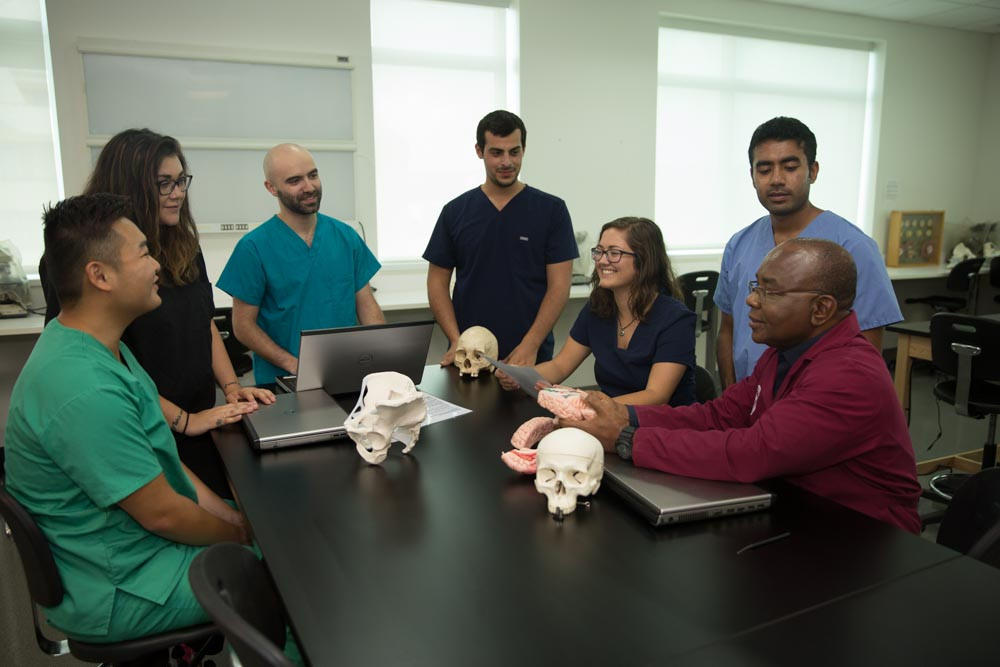To begin the new year, consider a resolution that may help keep you healthy — or at least more informed — throughout the year: learning about the thyroid gland. After all, January is Thyroid Awareness Month, when the American Thyroid Association (ATA) and medical professionals in general want to educate you on thyroid research and the prevention, treatment, and cure of thyroid-related diseases and thyroid cancer. The thyroid gland is a bit of a mystery to many people, despite it being right under your chin, at the base of the neck below the Adam’s apple. It is an important organ: the thyroid helps regulate heart rate, blood pressure, body temperature, and weight.
To start this new year thyroid education, we turn to an expert on the subject: Dr. Alexey Podcheko, a clinical endocrinologist and a professor at American University of the Caribbean School of Medicine (AUC) in Sint Maarten. Dr. Podcheko has studied the clinical and molecular pathology of the thyroid for more than two decades.
Q: What exactly is the thyroid gland and its function?
A: The thyroid gland is an organ that is located in the front of your neck, just below the thyroid cartilage. It is part of the endocrine system, which means it produces and releases hormones that regulate various functions in the body. The main job of the thyroid gland is to control metabolism and the rate of chemical reactions in the cells of the human body. The thyroid gland also affects other aspects of body function, such as the cardiovascular system (e.g., heart rate), respiratory system (e.g., breathing rate), gastrointestinal system (e.g., digestion), central nervous system (e.g., mood and memory), and more.
Q: How does the thyroid affect metabolism?
A: The thyroid is essential to growth and development and overall metabolism. The gland produces the hormones triiodothyronine (T3) and thyroxine (T4), which bind to receptors inside cells and encourage or inhibit the activity of certain genes. These genes are responsible for making proteins that perform various tasks in cells. For example, thyroid hormones can increase the production of proteins that help burn fat and glucose, which are the main sources of energy.
Q: Why is thyroid awareness so important?
A: Thyroid awareness is important because the thyroid gland is a key vital organ that affects many aspects of health and well-being. If the thyroid gland is not working properly, various problems and symptoms may arise. For example, an undiagnosed decreased thyroid function can slow your heart rate and make it harder for your heart to pump blood. This can increase your risk of having a heart attack or stroke.
Q: What are some common thyroid conditions?
A: The most common thyroid condition relates to thyroid nodules. These are lumps or growths in the thyroid gland that can be benign (noncancerous) or malignant (cancerous). Depending on their size and location, such lumps can cause pain, pressure, hoarseness, or difficulty swallowing. Another very common condition is hypothyroidism — when the thyroid gland does not produce enough thyroid hormones. This can slow the metabolism, cause weight gain, and make a person feel tired, cold, depressed, or constipated.
Q: What causes thyroid disorders?
A: There are different causes of thyroid disorders depending on whether the thyroid gland is underactive (hypothyroidism) or overactive (hyperthyroidism). For hypothyroidism and thyroid nodules, the most common causes are autoimmune thyroiditis (when the immune system mistakenly attacks the thyroid gland) and iodine deficiency (when the body does not get enough iodine, which is essential for making thyroid hormones). Hyperthyroidism may be caused by Graves’ disease (an autoimmune condition), thyroiditis (inflammation of the thyroid), or toxic nodules or toxic multinodular goiters.
Q: How are thyroid disorders diagnosed and treated?
A: Thyroid disorders are diagnosed and treated based on the type and severity of the condition, as well as on the symptoms and medical history of the patient. Most current methods for determining patient thyroid function are based on the T3, T4, and thyroid-stimulating hormone (TSH) concentration measurements in blood serum. These measurements are regarded as the most accurate thyroid function diagnosis methods and have high specificity and sensitivity to detect hypo- and hyperthyroid states. However, these methods are invasive, expensive ($30–100 USD per test), time consuming, and require a laboratory visit for blood sample collection.
Development of rapid, reliable, and inexpensive methods of estimating thyroid function is an urgent problem of medicine, especially in resource-limited countries such as Sint Maarten, where I live and teach. Improvements would allow for the screening of large populations in developing nations and in countries that lack resources or access to resources. Reflexometry (measuring the speed of Achilles, patellar, and other reflexes), believed to be a rapid, reliable, and inexpensive diagnostic screening method to evaluate thyroid status, as it has been utilized for more than 50 years in clinical practice.
At AUC, our research team has developed a mobile motion analysis software called the Thyroid Function Meter. Preliminary tests show that the algorithm allows us to indirectly measure thyroid function using any modern mobile cell phone device equipped with a high-resolution camera. We aim to expand our research to establish the validity and accuracy of the software in both healthy patients and those with hyper- or hypothyroidism, specifically against blood T3, T4, and TSH levels.
Q: What can people do to help maintain a healthy thyroid gland?
A: Some natural ways to help maintain a healthy thyroid gland include:
- Eating foods that are rich in iodine, selenium, and probiotics (e.g., seaweed and fish)
- Avoiding excessive consumption of foods that may interfere with thyroid function, such as cruciferous vegetables (e.g., broccoli, cabbage, and kale), soy products, gluten, and processed foods. These foods may inhibit the absorption of iodine or cause thyroid inflammation.
- Avoiding exposure to such environmental toxins as bisphenol A (BPA), pesticides, and heavy metals. These substances can disrupt the endocrine system and affect thyroid hormone levels.
- Getting regular checkups and blood tests to monitor thyroid function.
Q: What roles do molecular biology and genetics play in the diagnosis and therapy of endocrine disorders?
A: Molecular biology and genetics are crucial for the understanding, diagnosis, and management of endocrine disorders. They also facilitate the development of novel and personalized therapies for endocrine disorders and cancers.
Q: Are there new advancements in thyroid treatment on the horizon?
A: Thanks to molecular biology research, there are many advancements in the targeted therapies that treat thyroid cancer based on the genetic alterations in tumor cells. These therapies have shown high response rates and durable benefits for patients with advanced or metastatic thyroid cancer. There are also advances in thyroid surgery and ablation therapy that improve the precision and safety of the procedures. These advances include new techniques, devices, and imaging methods that reduce the risk of such complications as bleeding, vocal fold paralysis, and hypoparathyroidism.
Q: What exactly is endocrinology? How is it tied to thyroid medicine?
A: In general, endocrinology is the branch of medicine that deals with the endocrine system, which is the network of glands (e.g., thyroid, pancreas, pituitary, adrenal) and more than twenty hormones so far discovered. Endocrinology and thyroid medicine are closely related because they both deal with hormones and their effects on the body.
Q: What drew you to endocrinology?
A: I was fascinated with the importance and complexity of the endocrine system. I also realized that around 15 to 20% of people have at least one endocrine condition. I also was very disappointed that there are so many gaps in our knowledge of how to treat and diagnose common endocrine diseases, and I tried to make a difference by specializing in endocrinology.
Q: What aspects of endocrinology should everyone know?
A: I think it is very important to understand that our endocrine system works closely with the nervous system and the immune system to communicate and respond to internal and external stimuli. The endocrine system can be affected by such factors as genetics, environment, lifestyle, age, and disease. Everybody should know that some common endocrine disorders are diabetes, thyroid disorders, osteoporosis, adrenal disorders, and pituitary disorder. People with these conditions need to be referred to an endocrinologist for proper diagnosis and treatment.
Q: What do you find most rewarding about your field of medicine?
A: Endocrinology allows me to help people with various hormonal disorders that affect their quality of life. I enjoy the challenge of diagnosing and treating complex and diverse conditions that involve the endocrine system, such as diabetes, thyroid disorders, and adrenal disorders.
Q: You have been at AUC a while. What brought you — and keeps you — here?
A: I joined AUC because I enjoy teaching about various topics, including endocrinology, pathology, and clinical medicine. I also appreciate the diversity and excellence of the AUC community, which includes students, faculty, staff, and alumni from different backgrounds. What keeps me here is the passion and curiosity that I share with my colleagues and students, as well as the challenges and opportunities that I encounter every day.
Q: What is your favorite thing about the AUC campus? Or Sint Maarten itself?
A: My favorite thing about the AUC SXM (Sint Maarten) campus is the students, who are hardworking and strive for success. I also enjoy the cultural diversity and the natural beauty of the island, which enriches my personal and professional experience. Teaching in SXM is a unique and fulfilling opportunity that I cherish.
Q: How did you become involved in the Endocrine Focus Group, a student club at AUC?
A: I became involved in the Endocrine Focus Group at AUC SXM because I have a strong interest and was a practicing endocrinologist. (The group’s workshops educate students on diabetic foot care, using ultrasonography to detect anamolies in the thyroid gland, and other relevant topics.) When students approached me to join the group, I was happy to do it as I think I can help students select their future specialization by giving examples of how endocrinologists approach patients and how different their way of thinking is from internal medicine doctors.
Q: What activities beyond the classroom do you enjoy?
A: I enjoy spending a lot of time with my beautiful wife and daughter. On weekends, we like snorkeling in various parts of Sint Maarten. I love swimming, water biking, and playing tennis. Working in my garage workshop is another activity I enjoy a lot. It helps me switch from my daily work routine, rest my eyes from screens, and deal with stress.
For more on thyroid health, visit the National Institutes of Health (NIH) or the Centers for Disease Control and Prevention (CDC), and check out the ATA pages on the prevalence and impact of thyroid disease and the thyroid’s impact on weight.
At AUC School of Medicine, we’re training future endocrinologists and other specialist physicians. Our 2022–2023 MD graduates achieved a 97% first-time residency attainment rate* and are now beginning their post-graduate training across 24 specialties. Learn more about AUC and its MD program, as well as the requirements for admission. Thank you, Dr. Podcheko, for helping us raise thyroid awareness!
*Percentage of students attaining a 2023–2024 residency position out of all graduates or expected graduates in 2022–2023 who were active applicants in the 2023 NRMP match or who attained a residency position outside the NRMP match.





